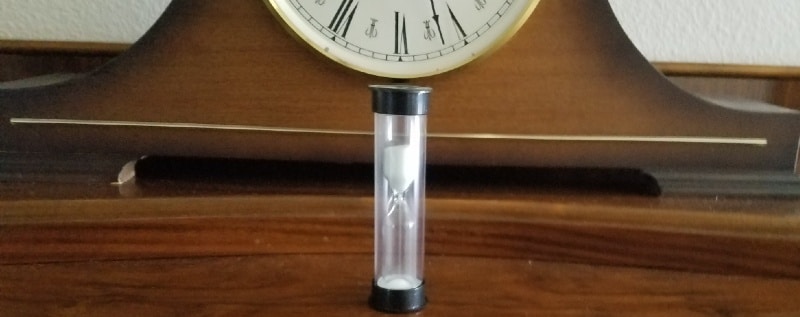Four Symptoms of Impatience In Triathlon Training

Triathletes are a motivated, driven group. However, we can often be guilty of impatience when training for a triathlon as we strive to become faster or go longer distances.
Younger athletes can get by with more impatience and carelessness in their triathlon training. However, older athletes are less tolerant to training errors. Recovery from training related injuries is longer. Some injuries may even be career ending.
Patience Is A Virtue Especially in Training
When I hear of patience, I am often reminded of the phrase ‘patience is a virtue’.
There are various thoughts on the origin of this phrase. Some attribute it to the early fifth century poem by Prudentius titled Psychomachia. Others credit William Langford in his 14th century poem Piers Plowman.
Students of the Bible can also make a case for this truth being taught in the Old Testament (BC) and the first century church. Old and New Testament verses, including Proverbs 16:32, Ecclesiastes 7:8-9, Isaiah 30:18, and Galatians 5:22-23, teach that patience is not only good, but a source of blessing.
That ‘patience is a virtue’ is timeless. This idea has been passed down through the ages because it is true, including for triathlon training.
What Does Impatience In Triathlon Training Look Like?
You know the feeling during a game of Taboo when the hourglass timer is running out of sand and your partner is contemplating a clue for the challenge word?
That’s the feeling of impatience. But it has nothing to do with triathlon.
However, the following thoughts, mostly based on experience, do apply to triathlon training. They are examples of how impatience can rear its ugly head in training.
1. Going Too Hard Too Soon
My run training has suffered over the past few winter months. Gyms require masks throughout the visit, something I cannot and will not do while running. On top of this, it’s too cold for me to run outside.
So, when I traveled to a warm climate for a few weeks this winter, I was ready to run.
I have lost count of the number of times I have strained a muscle or been too sore the next day to run. On this trip, however, I pledged to exercise patience.
During the first two weeks, I resisted running too fast, instead sticking to aerobic base building described in a recent post.
Sure enough, I saw the results I had hoped for. After two weeks of aerobic training, I was ready to introduce some intervals and long runs.
Patience is important because the quickest path to injury is to do too much too quickly.
2. Buying the Latest Gadget, Supplement, Or Gear To Make You Faster
Our sport has caught the attention of some brilliant marketers. Many promise that the latest supplement, pair of shoes, bike wheels, or gadget will make us faster.
During the earlier days of my triathlon journey, I succumbed to these messages. I still have some of these items in my closet, which I no longer use.
Of course, we need some basic gear to be competitive. For example, a heart rate monitor has made my training more effective by forcing me to ‘go slow’ while I build aerobic fitness.
Also, swapping my 18-speed Giant hybrid bike, which I used in my first triathlon, for a properly fitted, entry level triathlon specific bike (tri-bike) has made a tremendous difference in my bike times. Most of the improvement from the bike came from the difference in gearing between the two bikes.
After this, I quickly experience the law of diminishing returns. Gear that will help a younger, professional athlete shave seconds from his/her time is unnecessary for me, an amateur triathlete who is solely competing in the sport for fun and as a focus for staying physically fit.
For most of beginner triathletes, spending a week’s wages to shave weight from the bike will have less impact on our bike times than strengthening the relevant muscles or losing a few pounds.
That’s not just my idea. While writing this post, I received an email with a link to a TrainingPeaks article titled You Need a Stronger Body, Not a Better Bike.
The article summed up my sentiments. Most of us will get the greatest gains in performance from increasing our strength and endurance, not from spending on the latest fad or buying more expensive equipment.
3. Not Resting Properly or Enough
In a post on a rest and recovery for senior triathletes, Jim Chapman shared the benefits he has seen from increasing the amount of rest he gets. The patience to listen to your body or, in Jim’s case to his coach, is rewarded in the long run.
Driving ourselves too hard without proper rest can quickly lead to injury or, at a minimum, poorer results from the training.
Rest does not have to mean sitting on the couch watching movies. Cross-training that allows hard-worked muscles to repair can provide rest without sacrificing fitness.
Patience leads to a well recovered, adaptable body.
4. Not Sticking With Your Plan
If you are self-coached, like me, you may relate to this one. There are many free (e.g. library books, blog posts) or inexpensive resources for developing a triathlon training plan.
However, when improvement is slow, there is a tendency to change the plan frequently, even in small ways.
Then, if you are training alone, without a partner or as part of a group, the pressure to tweak the plan can be overwhelming.
There can be legitimate reasons to change a plan, especially if it is not working. However, we don’t want to be the proverbial dog who jumps when he hears the word ‘squirrel’.
Patience gives a solid plan a chance to produce results.
Patience Truly Is A Virtue In Triathlon Training
If you are beginning, patience is vital to improving your performance and gaining confidence while minimizing the risk of injury.
If you are an experienced triathlete, patience is a vital ingredient to training that leads to stronger performance. Patience leads to a strong finish.
Finishing is better than starting. Patience is better than pride.
Ecclesiastes 7:8
How Does Impatience Appear In Your Training?
What have you learned about patience during training?
Are there parts of your training with which you struggle in your training?
